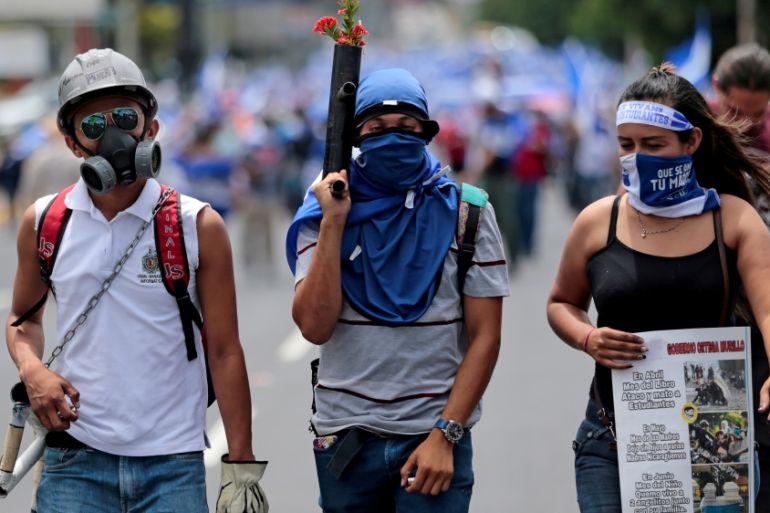Is Nicaragua in danger of slipping into civil war?
Concerns over armed confrontation and regional instability amid protests against President Daniel Ortega.

Every day, scores of people cross Nicaragua’s porous southern border to seek refuge in neighbouring Costa Rica.
In San Jose, the capital of Costa Rica, La Merced Park is crowded with newly-arrived Nicaraguans who took part in months of deadly anti-government protests.
The majority say they had to escape to elude a crackdown by paramilitary squads and police. The government of embattled President Daniel Ortega has labelled them terrorists.
According to the UN, more than 23,000 Nicaraguans have sought refugee protection in Costa Rica since the unrest erupted in April.
Some are students. Others are citizens who joined them, or family members who say they are now also being persecuted. But others are former Sandinista or Contra soldiers seasoned in battle – and some say they are itching to return to Nicaragua and pick up a gun to overthrow Ortega.
Among them is a man, who asked not to be named, from the northern region of Matagalpa, where several police officers were killed in fierce clashes at opposition-manned roadblocks and barricades.
While he waited at a soup kitchen where the Salvation Army provides lunch for those arriving, he covered his face to disguise his identity.
“The only thing for which I thank that b***** Ortega is for teaching me to use a weapon,” he told Al Jazeera.
Three others said that while they may be in their 50s, they too still know how to shoot and that they are willing to fight to the death to get rid of Ortega, whom they accuse of being a dictator.
They are all farmers who said they fought in the army against the US-financed Contra rebels, who tried to overthrow Ortega in the 1980s.
Their comments, at least for now, seem to be rooted in a desire based on deep frustration, rather than a well-articulated plan.
‘War weapons in hands of civilians’
But if a political solution to the crisis is not reached soon, there is a risk that it could evolve into a more violent confrontation, according to Victor Hugo Tinoco, a former deputy foreign minister under Ortega.
Today, Tinoco is a political opponent of the president and founder of the Sandinista Renovation Movement.
|
|
“In Nicaragua, the risk of a civil war, of an armed struggle, is much more real than in Venezuela, because in Nicaragua you have hundreds of thousands of people with military experience,” Tinoco told Al Jazeera.
“In the rural [areas], in urban areas, everywhere. And you also have hundreds and thousands of war weapons in the hands of civilians,” he added.
Lester Aleman, 20, was one of the student leaders who lit the spark that led unarmed civilians to take to the streets to protest against the Ortega government on April 18.
He has since gone underground in Nicaragua to avoid arrest, but he is still actively trying to keep the insurrection alive through mass peaceful protests.
“We do not support any armed option,” Aleman said. “Too many times Nicaragua has overthrown governments through violence just to end up with another dictatorship.”
“We need to change that vicious cycle and learn to bring about lasting democratic change through the peaceful mobilisation of our citizens,” he added.
![Ortega overthrew the Somoza dictatorship in the 1970s [Anadolu]](/wp-content/uploads/2018/08/75b97cdfe2054b0f9ef5f2cdac666813_18.jpeg)
Price of war
Former Sandinista Commander Dora Maria Tellez, who took up arms to overthrow the Somoza dictatorship in the 1970s alongside Ortega, said that Nicaragua cannot afford to repeat its history.
“I tell you, we will do absolutely everything, including the impossible, so that the civic movement and peaceful mobilisations will be the means of ridding us of this Ortega-Murillo dictatorship,” Tellez told Al Jazeera, referring to Rosario Murillo, the president’s wife and Nicaragua’s vice president.
“I lived through a war and I know just how painful it is and the price that a country has to pay for it,” said Tellez, who is also being investigated under Ortega’s new anti-terrorism laws.
The president claims that right-wing opponents living abroad are financing and directing the unrest, with the support of the US government. However, he has offered no evidence to back this.
Sergio Ramirez, a former vice president, said Mexico and especially the United States should be worried about the escalating situation.
“Instability in Nicaragua impacts all of Central America and brings with it greater migration flows towards the north. That is something that Mexico cannot ignore, nor can the United States, which is ultimately the final destination of these migratory waves,” Ramirez said.
What is clear is that the wave of discontent and anger in Central America’s poorest country is mounting as Ortega digs in his heels, refusing to consider demands for early elections before his term is due to end in 2021.
For a growing number of Nicaraguans, that is too long to wait.
How they deal with that frustration will be crucial in determining whether concerns of a new or an even more violent confrontation are well-founded.